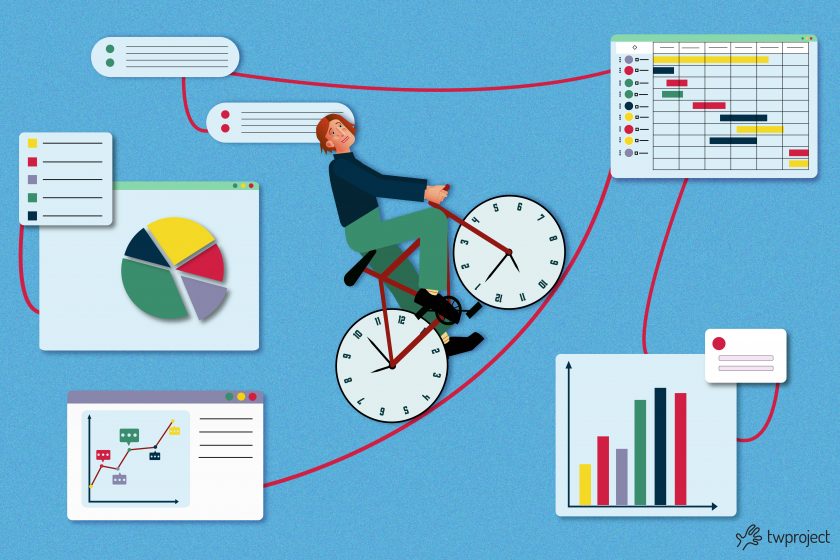Deadline management is like a safety net that prevents projects from plummeting into chaos.
Deadlines are milestones that mark progress and guide the team toward achieving goals. When deadlines are met, projects succeed, clients are satisfied, and the team can celebrate positive results.
So today, we will take a look at how best to manage deadlines and what tools can help.
CONTENT
Understanding deadline management
Deadline management is a process that helps project managers manage their resources, schedules, and endeavors within a given time frame without undermining outcome quality.
These are vital checkpoints that lead the project manager and their team through the management of a project’s priorities and various activities.
For a project manager, mastering deadline management involves:
- Balancing tasks with long-term project timelines
- Ensuring that all team members are aligned on the work to be undertaken
- Use proven strategies and technologies to keep the project on track.
Why many projects do not meet deadlines
As we already mentioned, deadline management is crucial to the success of any project.
Yet, even the most experienced project managers can face challenges that lead to missed deadlines.
Here are the main reasons for this shortcoming:
- Poor communication: A lack of clear and coherent communication can lead to misunderstandings regarding project goals and deadlines, significantly impacting the project schedule.
- Unrealistic expectations: Setting deadlines without a realistic estimate of the project scope and available resources often results in missed deadlines. Having a balanced view of what can be accomplished within a given time frame is crucial.
- Inadequate resource allocation: Insufficient or poor resource allocation, whether time, personnel, or materials, can hinder progress and cause delays.
- Procrastination: Postponing tasks until the last minute is a common problem that affects work quality and jeopardizes meeting project deadlines.
Failure to meet deadlines can have significant consequences, resulting in higher costs, strained stakeholder relations, and compromised corporate reputation.

Implementing effective project management tools can help you visualize activities correctly, improve communication, and efficiently allocate resources to ensure deadlines are met.
Principles of effective deadline management
Effective deadline management requires strategic planning, clear communication, and foresight to manage the complexities of a project.
Here are the basic principles for effective deadline management:
1. Setting reasonable deadlines
This involves a realistic assessment of the time needed to complete tasks, considering the team’s capabilities and job complexity. The project manager should set feasible deadlines at each level, following a logical sequence of activities. This, in turn, ensures that the team works at a sustainable pace and that quality standards are adhered to.
2. Prioritizing activities properly
Effective deadline management also means prioritizing tasks according to urgency and importance. Le scadenze critiche vengono rispettate solamente se ci si concentra prima sulle attività ad alta priorità.
3. Creating time buffers
Incorporating time buffers during the work cycle is a strategic approach to mitigate risks of unforeseen delays and ensure deadlines are met.
When unforeseen problems arise, the buffer allows the team to address the challenge without delaying the delivery of the project plan. Moreover, creating time buffers significantly reduces stress among team members.
4. Reevaluating and reprioritizing activities regularly
In the vibrant environment of project management, adaptability and flexibility are critical. Regularly reprioritizing tasks as necessary allows the team to quickly reevaluate its goals and shift its focus to more critical capabilities that align with current client needs. This practice helps meet deadlines and quickly adapt to changes, ensuring that an outdated plan does not compromise project success.
5. Assigning specific tasks to team members
Assigning specific tasks to individual team members adds a crucial layer of responsibility for managing deadlines. When employees know exactly what they are responsible for, it becomes easier for the project manager to monitor progress and spot bottlenecks ahead of time.
Effective deadline management with Twproject
Leveraging technology is a game changer for effective deadline management.
Specifically, a project management tool like Twproject provides a one-stop platform for planning, executing, and managing project timelines. This allows the team to know where the work is at all times and communicate effectively, thus reducing the chance of missing a deadline.
Twproject offers a more integrated and centralized solution for managing project deadlines and activities.
Unlike spreadsheets, which require manual updates to keep track of receipts and payments and note deadlines so they can be error-prone, Twproject allows you to automate your processes and ensure that all information is always up-to-date and accessible to all team members.
It also allows setting reminders and prioritizing tasks, helping to remember deadlines and keep track of progress, making project management easier and more manageable.
It also delivers valuable information through customizable reports and data analysis, thus helping the project manager make informed decisions.
Tasks can be sorted according to priority based on their urgency, so the team addresses high-priority and urgent tasks first, thus optimizing workflow and ensuring timely completion.
Hence, it becomes evident how a tool such as Twproject is designed to improve productivity and simplify deadline management. It is a powerful ally that offers comprehensive functionality to manage work accurately.
Try it for free.




